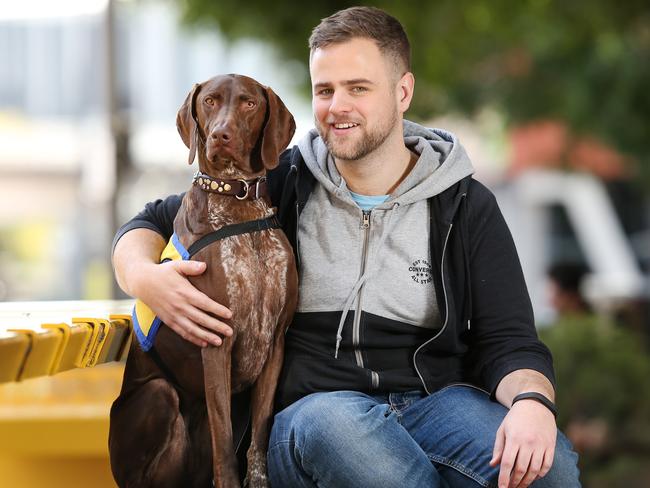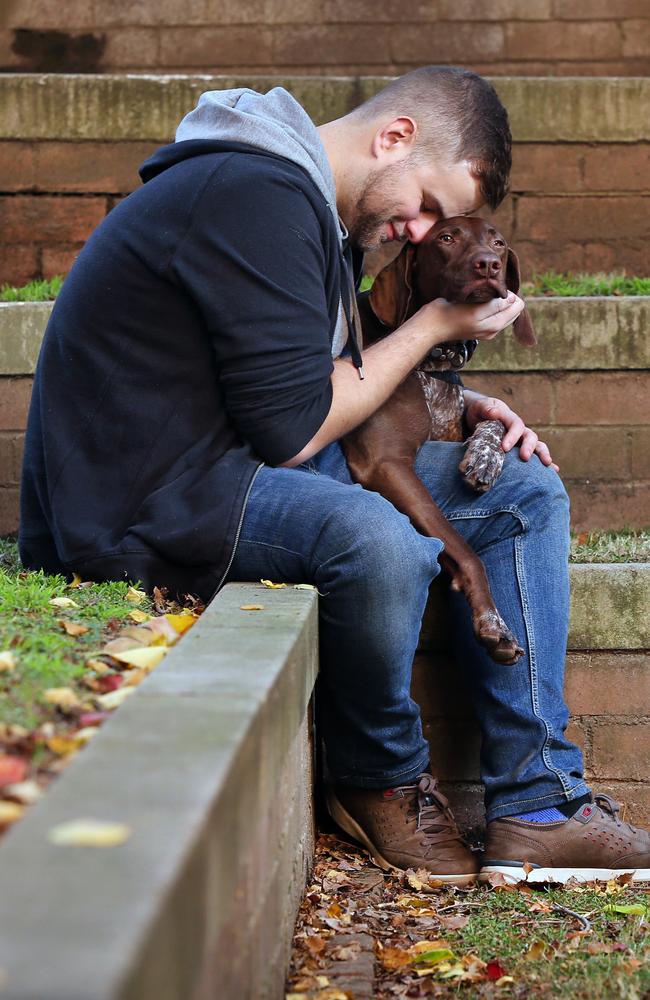Assistance dogs: How man’s best friend rescued her owner from depths of depression
WHEN student Jeremy Medlock, 29, suffered a nervous breakdown a few years ago, he turned to his dog, Frankie, for help.
Body+Soul Daily
Don't miss out on the headlines from Body+Soul Daily. Followed categories will be added to My News.
“I was diagnosed with cancer on my 16th birthday. I had a tumour in my knee, which needed chemotherapy, then a knee replacement, so I spent a year in and out of hospital.
Physically, it was tough, but mentally, it was harder and I began to experience small episodes of depression and anxiety every six to 12 months. I tried not to give my mental health too much airtime at first. I went straight back to high school, then did an animal and veterinarian bioscience degree at university. It was only once I graduated that I finally had some downtime to reflect on what I’d been through. I completely fell apart.
Nervous breakdowns vary from person to person, and for me, it came in waves. I went from being a capable and ambitious person who thrived under pressure to someone who found it almost impossible to even get out of bed to have a shower. Getting through the day without triggering an emotional episode was tough and I began to drive away the people I valued most as I increasingly retreated into isolation.

There’s only so much people around you can do to help you if you’re not willing to help yourself.
At my lowest point — around December 2013 to January 2014 — I could no longer go to the supermarket. The idea of having to choose between brands of cereal was enough to trigger the kind of panic attack that would leave me ashamed and crying in my car immediately after I’d fled the store.
Periods of not eating, followed by periods of binge-eating locked me in a vicious cycle, and although I felt tired all the time, I couldn’t sleep. I was diagnosed with borderline personality disorder and had to step away from a job I loved at an animal shelter because my effectiveness in my role was greatly diminished.

My dog, Frankie, and I found each other at exactly the right moment in our lives.
She was a rescue pup who was found dumped in a box and she came to me in early 2014 through my animal rescue work.
Although I was only supposed to be her foster carer, I quickly saw the huge difference this little German shorthaired pointer made to my life. With Frankie living in my apartment, I realised I had to take responsibility for someone who was depending on me.
I began leaving my apartment for the first time in ages to take her for walks, and created routines for play, feeding and exercise — small things on the outside, but a huge turning point for me.
MORE STORIES
BLOOD TEST DINNER PARTIES COMING SOON TO A HOUSE NEAR YOU
BOOST YOUR BRAIN POWER: EAT YOUR WAY TO A BETTER MIND
With a new-found confidence and with Frankie by my side, I was able to connect with a psychologist and commit to weekly sessions.
As I began talking through my feelings, I started to feel a shift and the walls I’d built around myself began to fall down. I felt able to connect with the world outside my apartment and I reached out to my family and friends, which was healing.
Once I realised what a positive impact Frankie was having on my mental health, I decided to get her trained as a psychiatric assistance dog.
She (Frankie) taught me to re-engage with the world and grow to become someone I’m now truly proud of. Together we can take on anything
I was already working with her to some degree to help me — for example, if I was feeling anxious, I’d get her to sit on my lap and that would calm me right down. Frankie, like most dogs, is highly intuitive and often knows if I need support before I even do.
She got to a stage where she’d watch me closely, then come over and place her head in my lap, which would alert me to the need to stop and stabilise my emotions before they got the better of me.
I went through this process with mindDog, an organisation that helps people like me by evaluating our dogs to ensure they’re suitable for the tasks being asked of them, then showing us how to train them to manage the needs of the handler’s particular disability.
Over an 18-month period when Frankie was a trainee assistance dog, she had to pass a public access test, which showed she was happy and comfortable in spaces where she’d not usually be able to go such as supermarkets, where she wasn’t going to be distracted by temptations like walking through the meat section.
She also learnt a few calming techniques such as deep pressure therapy, so that whenever I’m caught up in an emotional episode, she applies large amounts of uniform pressure to my body, which is not inconsiderable given that she’s a 25kg dog! Sometimes she’ll lie still on my chest and the pressure helps to calm me down immediately.

With Frankie by my side, I spent two years engaging with treatment practices — both in one-on-one sessions with a psychologist and group therapy sessions — and together we worked out a way for me to get through each day without experiencing severe emotional distress.
The treatment for my particular mental illness involves behavioural therapy more commonly than medication and I’ve worked hard at it. I guess I did better than expected, because in 2015, I decided to go back to university and press ‘play’ on my life once more.
Initially it was a terrifying experience, but I started my bachelor of interior architecture degree in 2016 and Frankie has been with me every step of the way, attending lectures and tutorials and pushing me when my tank is empty.
On days when I take off the vest that identifies her as a psychiatric assistance dog, she’s just happy to get attention.
So, what does the future hold?
Well, I plan to graduate next year and hopefully work in an environment designing commercial fit-outs, but no matter what I do in life, I know that managing my mental health will always be a consideration.
Sometimes it will be a daily challenge, other times weekly or monthly, but I’m now equipped with a wide range of coping strategies and Frankie plays a big part in that. She taught me to re-engage with the world and grow to become someone I’m now truly proud of. Together we can take on anything.”
* For more information about mindDog and details on how to get a psychiatric assistance dog, visit minddog.org.au
AS TOLD TO DILVIN YASA
REASONS DOGS REALLY ARE YOUR BEST FRIEND
THEY INCREASE YOUR LIFESPAN
Swedish scientists found that when people who live alone adopt a dog, they lower their risk of premature death by 33 per cent.
THEY KEEP THE DOCTOR AWAY
Dog owners are significantly less likely to need a GP, according to US researchers. They’re also better protected from the effects of stress.
THEY STRENGTHEN YOUR IMMUNE SYSTEM
Cuddling up to a pup won’t just boost your happy feels, it will help you fight off infections, says a study in the journal Psychological Reports.
Originally published as Assistance dogs: How man’s best friend rescued her owner from depths of depression


